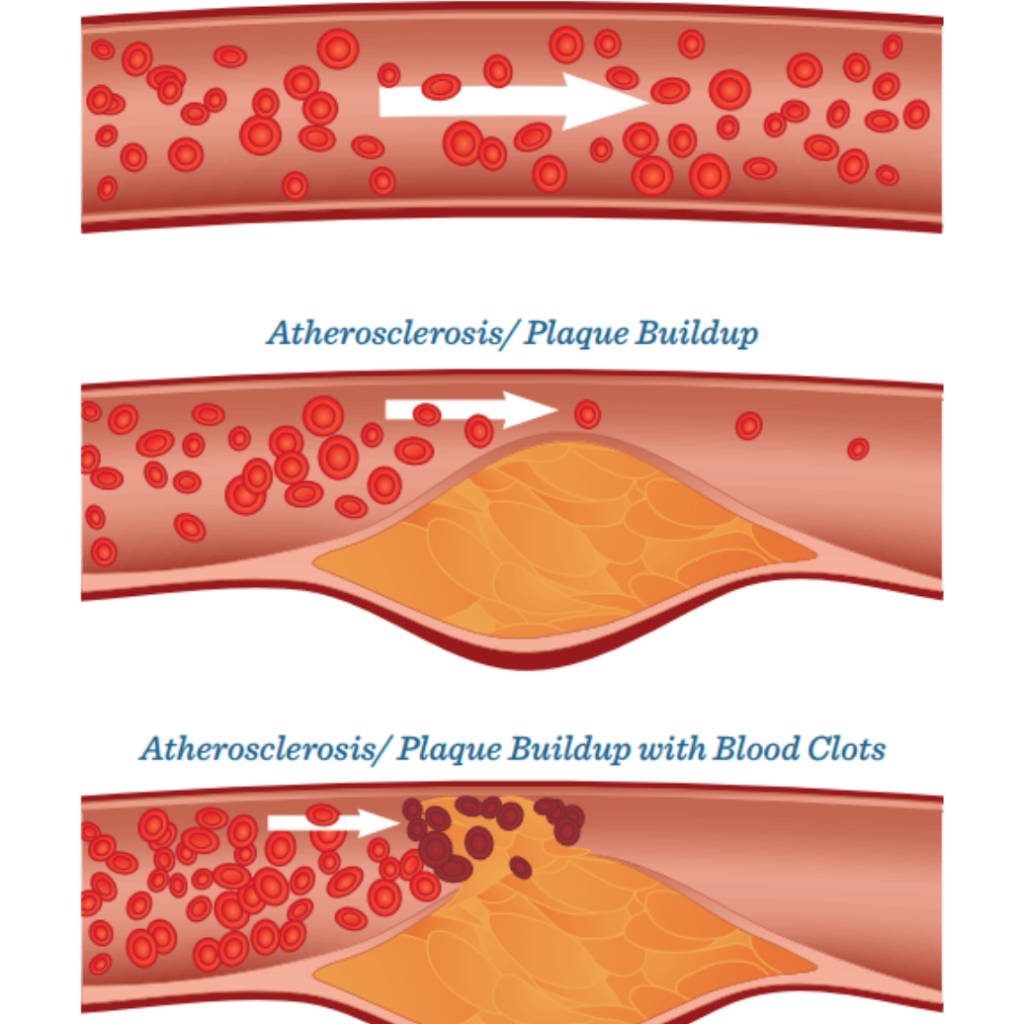What Is Atherosclerosis: Prevention & Treatment
Atherosclerosis refers to a serious problem with your arteries. They may be narrowed, enlarged, or hardened.
Signs of atherosclerosis include: a weak pulse, a pulse that cannot be located, decreased blood pressure in just one limb, and an unusual sound that can be heard over the arteries, using a stethoscope.
Atherosclerosis happens when your arteries become thick or stiff, and restrict blood flow.

A healthy artery is flexible, but arteries that are unhealthy harden.
This usually happens when there’s a build-up of cholesterol in your arteries.
These restrict blood flow.
The worst case scenario is that these trigger a blood clot.
Atherosclerosis is largely considered a heart problem, but it can happen to any artery in your body.
Atherosclerosis is both preventable and treatable.
Atherosclerosis is typically discovered during a physical exam, however, it can also be found during a diagnostic test.
These diagnostic tests can include the following:
- Ultrasounds. There are certain kinds of ultrasounds that can detect whether or not you have atherosclerosis. Usually, the ultrasound will measure your blood pressure across your arm or leg. The ultrasound then detects if there are any blockages in the artery, or if the speed of the blood flow is unusual.
- Stress tests. Stress tests don’t strictly test for atherosclerosis, however they can detect atherosclerosis. They are used as a way to measure your heart health more generally. If your tests come back abnormal, such as something that indicates a problem with the speed of your blood flow, you may have atherosclerosis.
- Cardiac catherization or angiograms. This diagnostic test specifically shows if your arteries are narrowed, blocked, or hardened. During an angiogram, your doctor injects you with a liquid dye. Then a catheter is fed through your artery. It usually happens through your leg or arm. That catheter runs straight through your heart. Any problems with your arteries are then visible through an X-Ray. This is one of the best ways to detect atherosclerosis.
- Electrocardiogram (also known as an ECG). Electrocardiograms record electrical signals as they travel to your heart. ECGs aren’t only used as diagnostic tests for atherosclerosis. They can also reveal other heart problems. Sometimes, they’re used during stress tests to detect if exercise is a trigger for heart disturbances.
- Blood tests. Blood tests that detect increased blood sugar levels and cholesterol can also point to atherosclerosis. To get the most accurate results, you will need to fast up to 12 hours before your blood test. If your doctor thinks that you need a blood test to determine whether or not you have atherosclerosis, you will be alerted ahead of time.
- Other imaging tests. In general, imaging tests will pick up problems with your arteries. Some imaging tests your doctor might suggest include CT scans or MRI scans. They will detect the most detail.
Call us at South Florida CardioVascular Specialists for a free consultation and learn if our atherosclerosis treatment is right for you.
Treating Atherosclerosis
Atherosclerosis is extremely treatable. It is a serious medical problem, however, it’s not a death sentence.
The first step to treating your atherosclerosis is lifestyle changes. Usually, atherosclerosis is caused by an unhealthy diet and a sedentary lifestyle.
Your doctor will recommend that you eat a balanced diet and get regular exercise. This exercise will include a balance of strength training and cardio.
If your situation does not improve with lifestyle changes, your doctor will then move to the medication route.
Medications for Atherosclerosis
Medications have been shown to both slow and reverse atherosclerosis.
Some medications you may be prescribed if lifestyle changes are not making a notable difference include:
- Cholesterol medication. Cholesterol plays a significant role in atherosclerosis.
- Medication that aggressively lowers “bad,” artery-blocking cholesterol will impact your atherosclerosis. You may also be prescribed medication that increases your “good” cholesterol. There are dozens of cholesterol medications your doctors may choose from. These kinds of medications are called statins. Cholesterol medication will help stabilize the lining of your arteries and prevent further atherosclerosis. Call us at South Florida CardioVascular Specialists for a free consultation and learn if our atherosclerosis treatment is right for you.
- Aspirin. Don’t underestimate how far aspirin can take you! Aspirin will prevent blood clots, as it’s a blood thinner. They prevent further blockage as well as treat current blockages.
- Beta-blockers. Beta blockers are the medication that are prescribed when you have more serious heart disease. While they lower your blood pressure, they receive pain and significantly reduce the possibility of heart attacks. They also help regulate your heart rhythm.
- Angiotensin-converting enzyme inhibitors. These will be prescribed in more serious cases of atherosclerosis. ACE inhibitors lower your blood pressure. They also reduce the risk of heart attacks. They are a serious medication, and will not be used a first line defense. or in more mild cases of atherosclerosis. Their efficacy is very high for people with serious cases of atherosclerosis.
- Calcium channel blockers. Calcium channel blockers lower your blood pressure and treat a range of heart problems. They will also relieve any pain caused by atherosclerosis.
- Medications for high blood pressure. People with high blood pressure are at risk for atherosclerosis. Blood pressure medication will help prevent or reduce instances of atherosclerosis. Interestingly, one such medication is diuretics.
In some rare cases, we may recommend surgical intervention. Atherosclerosis has to be extremely aggressive and severe for us to recommend surgery. Typically, this only happens in life or death situations. The surgeries your doctor may recommend include:
- Stent placement. A stent may be placed in the block artery to help direct blood flow.
- Endarterectomy. This is when your arteries are manually unblocked, and the deposits are surgically removed. This is usually done for arteries located in or around your neck, however it can technically be performed anywhere in the body.
- Fibrinolytic therapy. This is similar to an endarterectomy, except it’s when a blood clot is surgically removed. Blood clots can also be treated with certain medications.
Atherosclerosis is extremely treatable.
It’s not a death sentence by any means. If you suspect you may have atherosclerosis, please see your licensed physician as soon as possible. While treatment is available, it’s important to act quickly, and make sure you’re making the right lifestyle changes as soon as you’re able to. Call us at South Florida CardioVascular Specialists for a free consultation and learn if our atherosclerosis treatment is right for you.





